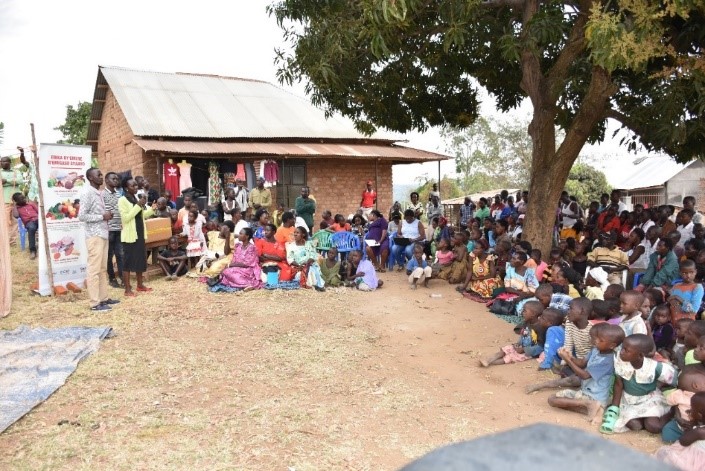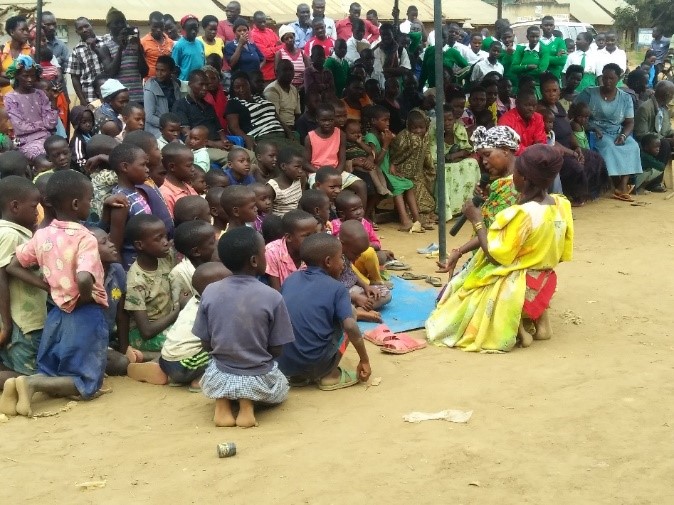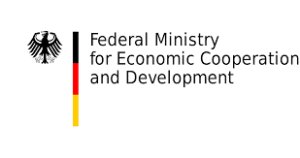By Eileen Bogweh Nchanji and Grace Nanyonjo
‘Tell me, and I forget. Teach me, and I remember. Involve me, and I learn.’
Women empowerment is cited as one of the pathways through which agriculture can improve nutrition. In most African countries, women are the main decision-makers of what is consumed at home. Therefore, their empowerment is vital in improving the nutrition of household members and even more important, the nutrition of young children.
Women empowerment is one of the cross-cutting themes of the BMZ funded project Making Value Chains work for Food and Nutrition Security in East Africa. The project is being implemented in Kenya and Uganda, and its main goal is to improve diets of the vulnerable rural and urban base of the pyramid (BoP) consumers and incomes of value chain actors.
In August 2018, the project team implemented gender and nutrition interventions amongst smallholder bean and amaranth farmers in Rakai and Wakiso Districts. A community exercise was conducted through drama, songs, and dance. The exercise was to mirror what happens in their daily lives as regards division of labor, nutrition, decision making, income generation and its effect on the household. At the end of the exercise, expected outcomes are behavior changes around consumption and community interaction among the members at home and in the farms. A song and dance introduced the drama series. The songs praised the king, who is the overseer of the people and touched on the importance of nutrition in the family and community.
The drama portrayed three families with different lifestyles. The first family had four household members: a husband, wife and two daughters. The woman and daughters cultivate beans, and the man sells the bean without leaving any for home consumption. He does not consult his wife when selling the beans neither does he reveal the proceeds from the sales. His wife and daughters are not happy because he does not pay the school fees for his daughters and does not respect his wife. The man spends the money from the bean sales on alcohol and women. Whenever he arrives home from his drinking sprees, he demands food and beats the wife when there is none. The wife gets fed-up with the husband’s attitude and decides to “side sell” the beans remaining in the house, the husband gets angry and sends his wife away. At her parents’ home, she is approached by another man who tries to woe her, and this leaves her contemplating whether to remarry.
In the second household, the man and woman work on the farm. From the sale of beans, the man decides to start up a business for his wife to ease household responsibilities. The wife became successful in this venture and loses respect for her husband. She starts drinking alcohol heavily, gets into a relationship with the man from the first household. One of the friends of both families tells the wife of the first household of her husband’s escapades, which also contributes to the separation in the first household.
In the third household, the man and woman work jointly on the farm and discuss what to do with proceeds from the sale of their crops. Visits by the couples in the first and second household point to conflicts they are facing. The couples from the third household decide to talk to each of the spouses from the other families on how to live happily. Several strategies were used: The man and woman each advised their mates from the other households on the need to make decisions on farm and households activities (For example what to plant and what quantities to sell and what to do with proceeds) together. The need to preserve food for household nutrition was highlighted and the need for farming as a business to sustain the family.
In between the show, nutrition staff from a private processing small and medium enterprise working in the project, Nutreal Ltd. and the Ugandan National Agricultural Research Organization (NARO) talked on the importance of nutrition. Children were primarily engaged in listing the healthy foods found on the chart. The crowd was educated on what a balanced meal is and the adverse effects of not eating healthy foods. The community was taught on the need to keep beans and other food products for home consumption and not sell all to maintain a nutritious and healthy family
The drama group closed the show by having a short question and answers session with the community. They were asked which household they preferred and the lessons they drew from the short play. They also prepared the super Kawomera instant porridge by Nutreal made of bio-fortified beans, millet, grain amaranth, maize, and soybeans and shared with the participants. The Super Kawomera flour is nutritionally balanced to contribute to the nutritional requirements of women of reproductive age and children below five years. The flour is instant and very tasty, therefore does not require any sugar addition. A 50-gram sachet sells for Uganda shillings 500 ($ 0.14) making it affordable to a wide range of consumers.
The porridge flour has been developed through a collaborative process with CIAT, NARO, two German universities (University of Goettingen and Hohenheim University), and farmers, under the BMZ funded project. Finally, the drama group thanked CIAT, NARO, and Nutreal Ltd for the opportunity to educate the communities on good nutrition and diet.
Snippets of discussion around the drama ground confirmed that drunkenness was a problem in the communities, exacerbating household violence and social ills.
Read more about the project:
Making value chains work for food and nutrition security of vulnerable populations in East Africa Low-income communities need more affordable and nutritious food
Making Value Chains Work for Food and Nutrition Security of Vulnerable Populations in East Africa” is supported by:
The CGIAR Research Program on Agriculture for Nutrition and Health (A4NH) has provided co-funding. It is a joint project between DAPA-Sustainable Food Systems and the Pan-Africa Bean Research Alliance (PABRA) under CIAT. The project is led by the International Center for Tropical Agriculture (CIAT), in collaboration with Kenya Agriculture and Livestock Research Organization (KALRO), Ugandan National Agricultural Research Organization (NARO), The University of Hohenheim (UHOH), and University of Göttingen (UGOE).





